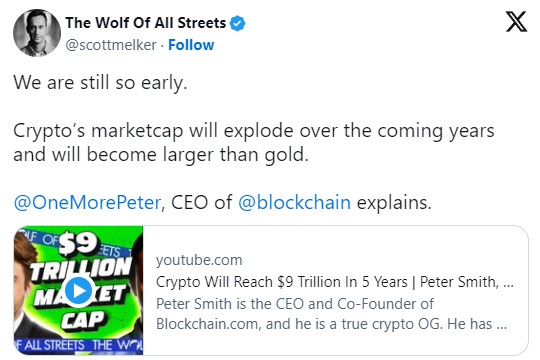Since its entry into the market, Blockchain.com’s CEO Peter Smith has made a bold prediction. In an interview, the CEO highlighted the potential changes tied to cryptocurrencies over the next five years, stating that their market value could surpass that of gold.
Smith’s Views on Cryptocurrency
While Smith’s views contain a degree of optimism, they may also hold a possibility of realism. The CEO, noting that the sector is still in its infancy, did not hesitate to reiterate his confidence in its growth.
Smith stated:
If you draw a line through the boom and bust cycles of crypto, it’s just straight to the right. I expect this to continue.
The CEO’s perspective is based on the fact that the cryptocurrency market is currently worth only a few trillion dollars. According to the CEO, it could take a decade for cryptocurrencies to reach their true value.
Cryptocurrencies Must Improve
The CEO also commented on the requirements for the industry to reach the aforementioned size, emphasizing the need for increased prevalence and advanced marketing.
Commenting on the main disadvantages, Smith said:
Crypto history is defined mostly by our massive explosions fueled by greed, and I think as an industry, if we want to be successful in the long run, if we want to build a truly global financial system for the internet, we need to learn to be less greedy, think more long-term, and be much more diligent in calling out and clearly separating people and companies in our space who do not adhere to this vision.
Is It Time for Institutional Adoption?
Despite regulatory challenges, Smith appears optimistic about institutional adoption. However, he does not shy away from commenting that such adoption has not yet fully materialized. According to the CEO, there are significant differences between the presence of institutional products in the market and genuine adoption.
He also reiterated his prediction that the cryptocurrency market could reach a value of 9 trillion dollars over the next five years.
Speaking of the US market, Smith also emphasized the lack of regulatory clarity. Nevertheless, he seems to maintain optimism that concrete steps could be taken in the coming period.

 Türkçe
Türkçe Español
Español










